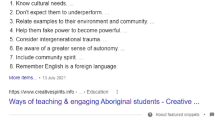Abstract
In these reflections, I identify complexities in few constructs that are often used in educational research, although not often critically, namely, social justice, race, ethnicity and identity. This paper suggests a non-ontological and non-epistemological approach to ethics as developed by Emmanuel Levinas as a normative means to deal with some of the complexities. In dealing with the construct of social justice, an ethical approach calls for productive research tools to not only understand exclusion but also to change situations of injustice to marginalised groups. Further, both constructs race and ethnicity can be used to identify groups of people based on their history, culture and/or lifestyles. As social constructions they have different historical origins and are open to alternative connotations, uses and abuses. An ethical perspective is useful to manage the dilemma of essentialism that group identification may lead into. Finally, the debate around the usefulness of the construct of identity raises some ethical questions about the role of research and the lived experience of its subjects. An ethical stance demands that constructs of analysis in social inquiry should not only demonstrate their utility for knowledge generation but also should demonstrate a responsibility for the construction and reconstruction of lifeworld in which academic endeavours are conducted.
Similar content being viewed by others
References
Atweh, B. (2007). What is this thing called social justice and what does it have to do with us in the context of globalisation? Philosophy of Mathematics Educational, (No. 21).
Atweh, B., & Keitel, C. (2007). Social justice in international collaborations. In B. Atweh, M. Borba, A. Calabrese Barton, N. Gough, C. Keitel, C. Vistro-Yu, & R. Vithal (Eds.), Internationalisation and globalisation in mathematics and science education (pp. 95–112). Dordrecht, The Netherlands: Springer.
Brubaker, R., & Cooper, F. (2000). Beyond “identity”. Theory and Society, 29, 1–47.
Christie, P. (2005). Towards and ethics of engagement in education in global times. Australian Journal of Education, 49, 238–250.
Cohen, R. (2001). Ethics, exegesis and philosophy: Interpretations after Levinas. Cambridge: Cambridge University Press.
Cohen, R. (2005). Levinas, Plato and ethical exegesis. In J. Bloechl & J. Kosky (Eds.), Levinas studies: An annual review (Vol. 1). Pittsburgh: Duquesne University Press.
Colic-Peisker, V. (2008). Migration, class and transnational identities: Croatians in Australia and America. Urbana and Chicago: Illinois University Press.
Erikson, E. H. (1968). Identity: Youth and crisis. New York: Norton.
Foucault, M. (1983). On the genealogy of ethics. In H. L. Dreyfus & P. Rabinow (Eds.), Michel Foucault: Beyond structuralism and hermeneutics (2nd ed., pp. 229–252). Chicago: The University of Chicago Press.
Foucault, M. (2000). Interview with Michel Foucault. In J. Faubion (Ed.), Power: essential works of Foucault 1954–1984. New York: New Press.
Fozdar, F., Wilding, R., & Hawkins, M. (2008). Race and ethnic relations. South Melbourne, Victoria: Oxford University Press.
Fraser, N. (1995). From redistribution to recognition: Dilemmas of justice in a postsocialist society. New Left Review, July-August, 68-93.
Fraser, N. (1997). Justice Interruptus: Critical reflections on “postsocialist” condition. New York: Routledge.
Fraser, N. (2001). Social justice in the knowledge society. Invited keynote lecture at the conference on the “Knowledge Society”. Berlin: Heinrich Böll Stiftung.
Fraser, N., & Honneth, A. (2003). Redistribution or recognition? A political-philosophical exchange. London: Verso.
Gewirtz, S. (1998). Conceptualizing social justice in education: Mapping the territory. Journal of Educational Policy, 13, 469–484.
Guillaumin, C. (1995). Racism. sexism, power and ideology. London: Routledge.
Hall, S. (1994). Cultural identity and diaspora. In P. Williams & L. Chrisman (Eds.), Colonial discourse and postcolonial theory: A reader (pp. 392–401). New York: Columbia University Press.
Heller, A. (1992). Rights, modernity and democracy. In D. Cornell, M. Rosenfeld, & D. G. Carlson (Eds.), Deconstruction and the possibility of justice (pp. 346–460). New York: Routledge.
Hollinsworth, D. (2006). Race and racism in Australia. Melbourne: Thompson/Social Science Press.
Levinas, E. (1969). Totality and infinity: An essay on exteriority (A. Lingis, Trans.). Pittsburgh, PA: Duquesne University Press.
Levinas, E. (1997). Otherwise than being or beyond essence (A. Lingis, Trans.). Pittsburgh, PA: Duquesne University Press.
McInerney, P. (2004). Making hope practical: School reform for social justice. Queensland: Post Pressed.
McLaren, M. (2002). Feminism. Foucault and embodied subjectivity. New York: State University of New York Press.
Miller, C., & Swift, K. (1977). Words and women. New York: Doubleday.
Roth, K. (2007). Knowledge, ethics and deliberation. In K. Roth & I. Gur-Ze’ev (Eds.), Education in the era of globalization (pp. 105–121). The Netherlands: Springer.
Roth, W.-M. (2007). Solidarity and the ethics of collaborative research. In S. Ritchie (Ed.), Research collaboration: Relationships and praxis (pp. 27–42). Rotterdam: Sense Publishers.
Sfard, A., & Prusak, A. (2005). Telling identities: In search of an analytic tool for investigating learning as a culturally shaped activity. Educational Researcher, 34, 14–22.
Young, I. M. (1990). Justice and the politics of difference. New Jersey: Princeton University.
Author information
Authors and Affiliations
Corresponding author
Additional information
Forum response to G. Seiler, Becoming a science teacher: Moving towards creolised science and an ethic of cosmopolitanism. Cultural Studies of Science Education.
Rights and permissions
About this article
Cite this article
Atweh, B. Reflections on social justice, race, ethnicity and identity from an ethical perspective. Cult Stud of Sci Educ 6, 33–47 (2011). https://doi.org/10.1007/s11422-010-9305-3
Received:
Accepted:
Published:
Issue Date:
DOI: https://doi.org/10.1007/s11422-010-9305-3




